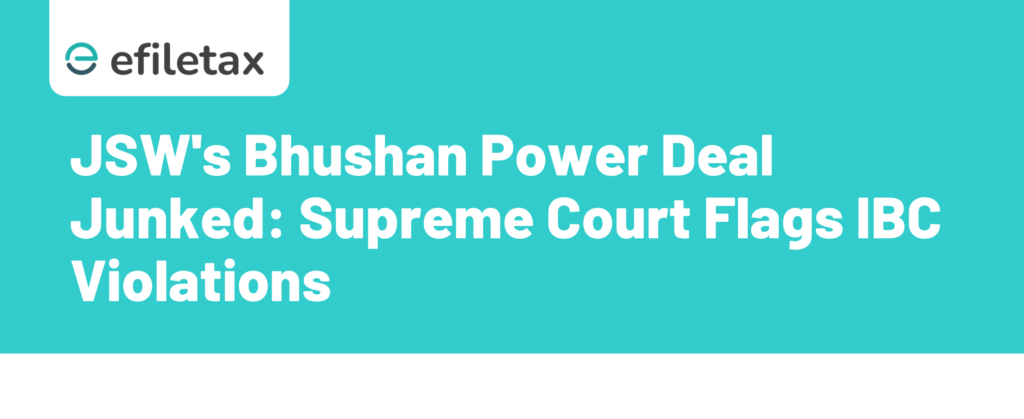
Introduction:
JSW resolution plan rejected — a landmark Supreme Court decision has rattled India’s insolvency landscape. The case of Bhushan Power and Steel Limited (BPSL) shows how non-compliance with the Insolvency and Bankruptcy Code (IBC) can overturn even high-profile bids. Here’s a simplified breakdown of what went wrong, the legal reasoning, and what this means for future resolution applicants.
What Was the Case About?
- Bhushan Power & Steel Ltd. (BPSL) underwent insolvency under IBC, 2016
- JSW Steel emerged as the successful resolution applicant
- Committee of Creditors (CoC) approved the plan under Section 30(4) of IBC
- However, multiple procedural lapses and alleged irregularities surfaced
- The Supreme Court eventually struck down the resolution plan
Why Did the Supreme Court Invalidate the Plan?
1. Material Non-Disclosure
- Resolution plan concealed critical information regarding pending investigations
- This violated Section 30(2)(e) of IBC – plan must not contravene any existing law
2. COC’s Role Under Scrutiny
- The Court criticised the CoC for approving the plan without proper due diligence
- Undermined the role of judicial oversight envisaged under Section 31
3. Ineligibility of Resolution Applicant
- Allegations of JSW’s linkages with erstwhile promoters raised red flags
- Violated Section 29A – bars connected parties from submitting plans
4. Procedural Irregularities
- The plan was allegedly modified post-approval without proper re-vetting
- Contravenes Regulation 39(3) of IBBI (Insolvency Resolution Process for Corporate Persons) Regulations, 2016
Key IBC Provisions Referenced
| Section | Description |
|---|---|
| 29A | Disqualification of related parties from bidding |
| 30(2) | Conditions for a valid resolution plan |
| 30(4) | CoC approval threshold (66%) |
| 31 | Judicial approval by NCLT |
| Regulation 39(3) | Modification of resolution plans |
Expert Take: Avoid These Pitfalls in IBC Process
- Tip from a Practicing Insolvency Professional:
“Never assume CoC approval is the final word. Judicial scrutiny is real, and legal compliance must be airtight.” - Resolution applicants should:
- Conduct background due diligence on promoters
- Make full disclosures – no grey areas
- Avoid post-approval plan tweaks without re-approval
What This Means for Businesses
- Sets a high bar for transparency and compliance
- Reinforces that procedural lapses can override financial bids
- Caution for companies looking to acquire stressed assets under IBC
FAQ: JSW-Bhushan Power Case Simplified
Q1: Was JSW found guilty of fraud?
No, but lapses in disclosure and procedural flaws led to plan invalidation.
Q2: Can JSW re-submit a revised plan?
Only if permitted by the NCLT/NCLAT based on current proceedings.
Q3: Does this affect other IBC cases?
Yes, it sets a precedent for stricter scrutiny of resolution plans.
JSW’s resolution plan for Bhushan Power was struck down by the Supreme Court due to IBC violations — including lack of disclosure, ineligible connections, and CoC irregularities. A major reminder: financial bids under IBC must meet strict legal standards.